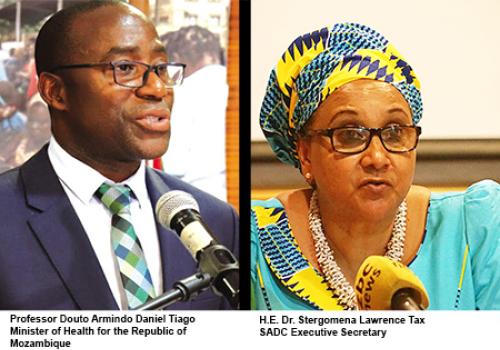The Ministers of Health of the Southern African Development Community (SADC) on 11th May, 2021 held a virtual meeting to discuss the COVID-19 epidemiological situation in the Region and come up with recommendations to mitigate the spread of the pandemic.
Honourable Professor Douto Armindo Daniel Tiago, Minister of Health of the Republic of Mozambique, chaired the meeting in his capacity as the Chairperson of the SADC Ministerial Committee on Health.
Delivering his opening remarks, Hon. Professor Tiago said despite the efforts and progress made in Member States so far in relation to COVID-19, there is still a need to strengthen and reinforce joint plans to ensure the availability of the COVID-19 vaccine, as well as to sustain the gains achieved in the Region. He urged Member States to remain engaged in the fight to reduce the increase in cases and mortality caused by COVID-19 pandemic.
Hon. Tiago lamented some challenges still facing Member States such as receiving vaccines in small quantities, which makes it difficult to plan vaccination roll out and short shelf life of vaccines which undermine proper and effective vaccination processes.
SADC Executive Secretary, Her Excellency Dr. Stergomena Lawrence Tax, said while the COVID-19 general outlook in the SADC Region has been steadily improving, the trajectory of the outbreak remains unpredictable. She noted a decline in the number of new cases of COVID-19, except in few Member States. Dr. Tax commended Member States for their coordinated response and robust approach in the implementation of public health and socio-economic measures in dealing with the pandemic since its outbreak.
Dr. Tax said while the SADC Region appeals for increased and equal access to vaccines, emphasis should also be placed on the enhancement of capacity, both at regional and national levels in research and manufacturing of medicines and vaccines for COVID-19 and other diseases, and in exploring alternative solutions.
The Executive Secretary commended the Expanded Technical Committee for Coordinating and Monitoring the Implementation of the SADC Protocol on Health for developing guidelines and Standard Operating Procedures to facilitate cross-border movements of goods and public health surveillance at points of entry.
During the meeting, the Ministers urged Member States to continue strengthening existing disease control activities, including epidemiological surveillance, strategic testing and increase routine systematic sequencing of representative samples of SARS-CoV-2 isolates from across the country whenever possible.
They urged Member States to share information on the types of vaccine and numbers of doses they are receiving from suppliers in order to strengthen vaccine coverage monitoring in the Region through the Secretariat, for wider dissemination among Member States.
The Ministers also urged Member States to Strengthen the Regulatory Capacity of National Regulatory Agencies (NRA) to conduct vaccine assessment and issue emergency use authorisations; and to proactively build and maintain trust in the COVID-19 vaccine by engaging communities in order to mitigate the increasing mistrust and vaccine hesitancy as part of the pandemic response.
They called upon Member States to vaccinate SADC citizens residing within their territories including, but not limited to diplomats, migrants, students and those residing along the borders.
Member States were urged to share lessons and experiences on the manufacture, distribution and management of vaccines including information on potential investors willing to set up manufacturing plants within the SADC Region.
The Ministers of Health urged Member States to continue using COVID-19 Test Certificates to allow a smooth and gradual resumption for all economic activities and ensure non-discrimination until Herd Immunity is reached for all Member States, and gradually move towards the vaccine certificates.
They directed SADC Secretariat to mobilise resources to support ongoing research on COVID-19 African Traditional Medicine.
The Ministers also requested the World Health Organisation to help Member States to track and tackle new variants by helping to build and boost complex genomic surveillance capacities needed to detect and respond to new variants, shipping samples to sequencing laboratories and providing supplies, technical guidance and financial support to countries for laboratory equipment.

